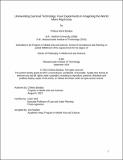Uninventing Carceral Technology: Four Experiments in Imagining the World More Rigorously
Author(s)
Barabas, Chelsea Marie
DownloadThesis PDF (1.451Mb)
Advisor
Steil, Justin
Terms of use
Metadata
Show full item recordAbstract
How do we advance social justice in an increasingly datafied world? Against a backdrop of burgeoning social movements, data-driven technologies have become an important terrain of struggle. That’s because the design and implementation of technology is not simply about the creation of software and hardware objects, but the negotiation of practices and possibilities for living life together differently (Suchman 2007). In this dissertation, I examine the role of technology in shaping our collective imaginations of what is possible in the context of the carceral state. By carceral state, I mean the expansive system of state-sanctioned capture, confinement, and control that underpins our current unjust social order. Drawing on rich intellectual traditions such as feminist, Indigenous, and Black studies, I interrogate the default assumptions underlying the design and implementation of data-intensive systems, in order to fundamentally reimagine the role of technology in larger struggles for justice. Ultimately, the aim of this work is to experiment with ways of “un-inventing” (MacKenzie 1993) carceral technology, by reconfiguring the structural, interpersonal, and personal aspects of computation to the point that harmful algorithms are no longer created.
Date issued
2023-09Department
Program in Media Arts and Sciences (Massachusetts Institute of Technology)Publisher
Massachusetts Institute of Technology